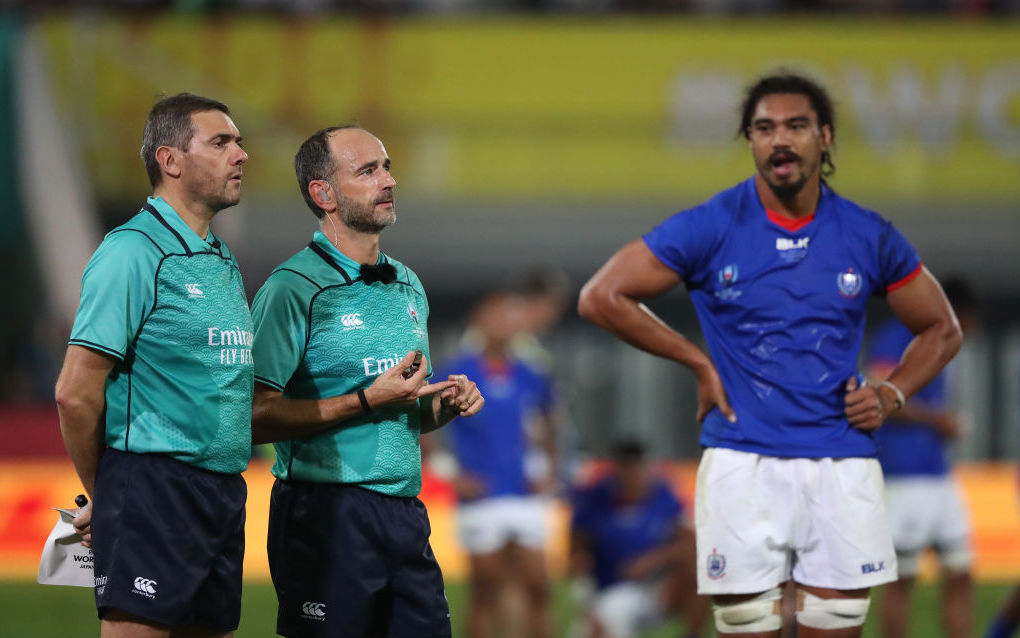The game is being brought into serious disrepute over confusion surrounding refereeing inconsistencies at the tackle point, and there’s no clear solution in sight, writes CRAIG LEWIS.
I don’t know about everybody else, but I’ve lost track of the controversial on-field officiating, citings, cards and backlash at this World Cup.
In the upcoming print issue of SA Rugby magazine, I was moved to pen a piece on the issue after World Rugby had acknowledged there was real concern over some of the refereeing decisions made at the start of the tournament.
The problem hit home again during the crunch pool match between Wales and the Wallabies at the end of September. The primary talking point was the decision by Romain Poite and his officials to penalise Samu Kerevi for leading with his elbow as he carried the ball into contact against Wales’ Rhys Patchell.
Wallabies captain Michael Hooper reacted with incredulity, and insisted Poite had got the call completely wrong, and that Patchell was the man at fault for going in high as he looked to bring Kerevi to ground.
Afterwards, coach Michael Cheika raged, suggesting that as a former player he was ’embarrassed’ by some of the decisions being made, and went so far as to say: ‘To be honest, I don’t know the rules anymore, I honestly don’t.’
WATCH: Cheika: I don’t know the rules anymore
Let’s pause for a moment. Emotion aside, it has to be a serious concern that a top coach of a leading team is voicing serious confusion over just how to instruct his players to engage in contact.
And he’s not alone.
This past weekend, Japan overcame Samoa in an enthralling battle, but this time it was the turn of Samoan coach Steve Jackson to highlight a similar concern.
His sentiments centred around the decision from referee Jaco Peyper to yellow-card TJ Ioane for a late tackle on Kotaro Matsushima, but while later deeming that Japan lock James Moore’s late hit on Tim Nanai-Williams was only worth a penalty.
‘You could play a game of poker with the amount of cards going out at the moment,’ Jackson commented colourfully. ‘I’m lost for words. We are on the end of another call when you are hit in the chest. I don’t know what you can do anymore in this game. You tackle low and you get “No arms” [penalty] for going around the leg, you tackle a little higher and guys are dropping in the tackle. ‘
He does have a point. The application of sanctions around the tackle area has become an almighty mess. Let’s not even dare go back to reference Owen Farrell’s late hit on Andre Esterhuizen at the end of last year.
Yet, the warning signs did come sharply into focus then, and they have only got clearer at this World Cup.
At the end of the day, Jackson’s points do resonate. Some referees are downgrading a potential high-tackle yellow card to just a penalty due to the ‘mitigating circumstances’ of a player dipping slightly before receiving the hit.
How much of a dip constitutes mitigation, though? What if every player starts ducking into tackles? Who then is to blame?
Then there are players jumping into tackles, but receiving no punishment. What about those players who tackle low, but fail to completely wrap an arm around flailing legs and are pinged for a grasscutter tackle?
It’s all a bit of a mess, and in a game as physical and fluid as rugby, players and referees must surely be starting to second-guess themselves when it comes to the contact points.
A player wants to make a dominant hit, but in the back of their minds, they must be aware of just how strictly this area of the game is being policed and just how careful they need to be.
It’s clear that players and coaches are confused. They’ve admitted as much. It’s also been evident that with the interference and regular involvement of officious TMOs, that referees are beginning to second-guess themselves, too.
On more than one occasion it’s been evident that the referee views an incident one way and the TMO another. The on-field official holds the authority, but you can understand the tendency to be swayed by a TMO sitting closely in front of a big-screen TV as opposed to staring up at a small stadium monitor.
It’s difficult to know what the solution is at this midway point of the tournament. There surely isn’t a quick fix.
But before the playoffs roll around, World Rugby would do well to get all the officials in a room and set down some clear instructions on the way to approach their decision-making at the tackle point.
Once everyone is on the same page, this then needs to be communicated to all the coaching staff, including the confused likes of Cheika and co.
One way or another, it would be a travesty if one of the big knockout matches is decided by an inconsistent or controversial referee’s decision.
Photo: Stu Forster/Getty Images





